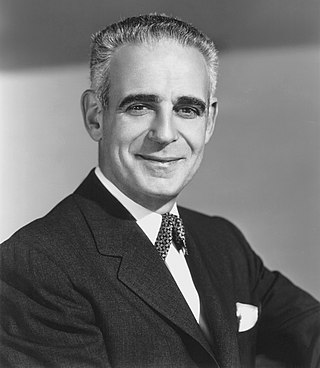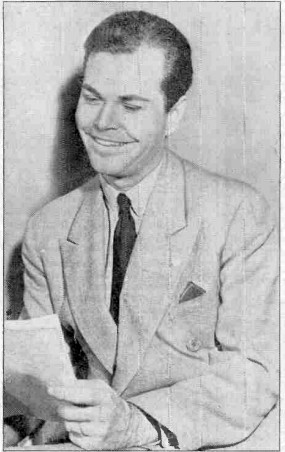Related Research Articles

Fredrick Malcolm Waring Sr. was an American musician, bandleader, and radio and television personality, sometimes referred to as "America's Singing Master" and "The Man Who Taught America How to Sing". He was also a promoter, financial backer and eponym of the Waring Blendor, the first modern electric blender on the market.

Lux Radio Theatre, sometimes spelled Lux Radio Theater, a classic radio anthology series, was broadcast on the NBC Blue Network (1934–35) ; CBS Radio network (1935–54), and NBC Radio (1954–55). Initially, the series adapted Broadway plays during its first two seasons before it began adapting films. These hour-long radio programs were performed live before studio audiences. The series became the most popular dramatic anthology series on radio, broadcast for more than 20 years and continued on television as the Lux Video Theatre through most of the 1950s. The primary sponsor of the show was Unilever through its Lux Soap brand.

Counterspy was an espionage drama radio series that aired on the NBC Blue Network and Mutual from May 18, 1942, to November 29, 1957.

Paul Stewart was an American character actor, director and producer who worked in theatre, radio, films and television. He frequently portrayed cynical and sinister characters throughout his career.

Edwin Lloyd "Ty" Tyson was an American sports broadcaster and radio play-by-play announcer.

The Fred Waring Show is an American television musical variety show that ran from April 17, 1949 to May 30, 1954 on CBS. The show was hosted by Fred Waring and featured his choral group "The Pennsylvanians".

Shawnee on Delaware is an unincorporated community on the Delaware River, part of Smithfield Township in Monroe County, Pennsylvania, United States. It is situated just south of the foothills of the Pocono Mountains, 2.6 miles (4.2 km) southwest of the Shawnee Mountain Ski Area and approximately 75 miles (121 km) west of New York City.
Adopted Daughter was a radio soap opera in the United States. It premiered in 1937 on station WOW in Omaha, Nebraska, and moved to NBC's Midwest regional network in 1939. It was broadcast there five times a week for two years. The show was sponsored by J. C. Penney. Billboard magazine noted that the program was J.C. Penney's "first use of radio on a national basis." After 26 successful weeks on WOW, the program would be carried on 16 stations via transcription.

Electrical transcriptions are special phonograph recordings made exclusively for radio broadcasting, which were widely used during the "Golden Age of Radio". They provided material—from station-identification jingles and commercials to full-length programs—for use by local stations, which were affiliates of one of the radio networks.

The Frank Sinatra Show was a title applied—in some cases specifically and in other cases generically—to several radio musical programs in the United States, some of which had other distinct titles as indicated below. Singer Frank Sinatra starred in the programs, some of which were broadcast on CBS, while others were on NBC.
The Crime Files of Flamond was a radio crime drama in the United States. From 1946 to 1948 it was broadcast on WGN and syndicated to other stations by transcriptions. From January 7, 1953, to July 1, 1953, it was carried on the Mutual Broadcasting System. Mutual revived the program On April 4, 1956, and ran it until February 27, 1957.
The Avenger is the name of two old-time radio crime dramas in the United States. The first one was broadcast weekly on WHN in New York City, New York, July 18, 1941 – November 3, 1942. The second was syndicated nationally October 25, 1945 – April 18, 1946. It was the first program distributed by WHN Transcription Service, which previously had distributed only commercials.
Calling All Cars is an old-time radio police drama in the United States. It was broadcast on the CBS West Coast network and on the Mutual-Don Lee Network November 29, 1933 - September 8, 1939 and carried by transcription on stations in other areas. The program was notable for being one of the first police dramas on radio.
Claudia and David is an American old-time radio drama. One version was broadcast on CBS July 4, 1941 - September 26, 1941 and another was syndicated in 1947.
Hallmark Playhouse is an American old-time radio dramatic anthology series. It was broadcast on CBS from June 10, 1948 until February 1, 1953, and was described by one author as "a program that consistently produced the highest levels of production quality and value." Beginning on February 8, 1953, the program underwent changes of title, host, and format. It was broadcast as The Hallmark Hall of Fame until March 27, 1955, still on CBS.
Hop Harrigan is an American old-time radio juvenile adventure program. It was broadcast on ABC from August 31, 1942, until August 2, 1946, and on Mutual from October 2, 1946, until February 6, 1948. General Foods began sponsoring the program on October 2, 1944; it had previously been unsponsored.
The Hour of Charm is an American old-time radio music program. It debuted on CBS on May 18, 1934, and had its final broadcast on CBS on May 2, 1948. The program also was broadcast on Armed Forces Radio, and after its network broadcasts ended, a new version was syndicated via transcriptions.

Howie Wing is an American old-time radio juvenile aviation adventure serial. It was syndicated by the World Broadcasting System and distributed initially to stations in Canada, beginning on January 31, 1938. The Don Lee Network began carrying it in the western United States on February 12, 1938. The program was broadcast weekdays on CBS from October 3, 1938, until June 30, 1939.

The Jack Carson Show is an American old-time radio comedy-variety program. It was broadcast on different seasons on CBS and NBC, beginning on June 2, 1943, and ending on December 20, 1956. The program was also known as The Sealtest Village Store, and the New Jack Carson Show. It was carried on the CBC Dominion network in Canada, as well. Additionally, The Jack Carson Show is the title of a television program that was broadcast on NBC from October 22, 1954, until March 11, 1955.

Kay Kyser's Kollege of Musical Knowledge is an American old-time radio musical quiz program starring Kay Kyser. It was broadcast on Mutual, NBC, and ABC beginning on February 1, 1938, and ending on July 29, 1949.
References
- 1 2 Dunning, John (1998). On the Air: The Encyclopedia of Old-Time Radio (Revised ed.). New York, NY: Oxford University Press. pp. 269–271. ISBN 978-0-19-507678-3 . Retrieved 2019-09-09.
- 1 2 Reinehr, Robert C.; Swartz, Jon D. (2010). The A to Z of Old Time Radio. Scarecrow Press. pp. 103–104. ISBN 9781461672074.
- ↑ "Fred Waring Show" (PDF). Broadcasting. July 29, 1957. p. 20. Retrieved 28 November 2017.
- ↑ Chase, Gilbert (1946). Music in Radio Broadcasting (PDF). New York: McGraw-Hill Book Company. p. vii. Retrieved 17 June 2023.
- ↑ Rhoads, B. Eric (1996). A Pictorial History of Radio's First 75 Years (PDF). West Palm Beach, Florida: Streamline Publishing, Inc. p. 219. ISBN 1-886745-06-4 . Retrieved 28 November 2017.
- ↑ "Behind the Mike" (PDF). Broadcasting. October 18, 1943. p. 40. Retrieved 28 November 2017.
- ↑ Danilov, Victor J. (2013). Famous Americans: A Directory of Museums, Historic Sites, and Memorials. Scarecrow Press. p. 170. ISBN 9780810891869 . Retrieved 11 November 2017.
- ↑ "300 Get Ford Discs" (PDF). Broadcasting. January 15, 1935. p. 35. Retrieved 28 November 2017.
- 1 2 "Court Recognizes Recorder's Rights" (PDF). Broadcasting. March 1, 1939. p. 49. Retrieved 23 December 2017.